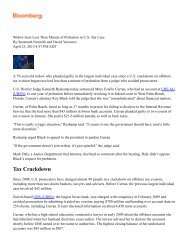Reply Memorandum of Law in Support of Motion to Correct Illegal ...
Reply Memorandum of Law in Support of Motion to Correct Illegal ...
Reply Memorandum of Law in Support of Motion to Correct Illegal ...
Create successful ePaper yourself
Turn your PDF publications into a flip-book with our unique Google optimized e-Paper software.
Case 2:83-cr-00314-GP Document 245 Filed 01/11/11 Page 10 <strong>of</strong> 13<br />
direct appeal, the federal appellate court would have remanded for resentenc<strong>in</strong>g and the<br />
district court would have resentenced Jones <strong>to</strong> the same 360-month term <strong>of</strong> imprisonment.<br />
Jones appealed <strong>to</strong> the Eleventh Circuit from the district court’s denial <strong>of</strong> his Section 2255<br />
<strong>Motion</strong>. The Eleventh Circuit vacated Jones’ sentence, remanded for resentenc<strong>in</strong>g and<br />
expla<strong>in</strong>ed that the test for determ<strong>in</strong><strong>in</strong>g prejudice “is not what the court might have done; the<br />
test is whether the orig<strong>in</strong>al sentence comported with the law.” 224 F.3d at 1259 (citation<br />
omitted, emphasis added). The Eleventh Circuit further expla<strong>in</strong>ed that “a particular judge’s<br />
sentenc<strong>in</strong>g practices should not be considered <strong>in</strong> the prejudice determ<strong>in</strong>ation.” Id. at 1259-<br />
1260. (citations omitted). Thus, the Eleventh Circuit held that, when a defendant’s sentence<br />
is vacated on the basis that it is an illegal general sentence, the district court is required <strong>to</strong><br />
hold a de novo sentenc<strong>in</strong>g at which the district court may sentence the defendant <strong>to</strong> a lesser<br />
term <strong>of</strong> imprisonment than that orig<strong>in</strong>ally imposed.<br />
Notably, the Third Circuit has held that, where a resentenc<strong>in</strong>g is required <strong>to</strong> correct<br />
a sentence that is illegal under former Rule 35(a), “[i]n resentenc<strong>in</strong>g a defendant the district<br />
court is required <strong>to</strong> exercise its discretion anew <strong>in</strong> fix<strong>in</strong>g the penalties and need not simply<br />
choose from among the sentences it orig<strong>in</strong>ally imposed.” United States v. Corson, 449 F.2d<br />
544, 551 n. 16 (3d Cir. 1971). Mr. Mar<strong>to</strong>rano presently has a s<strong>in</strong>gle undivided sentence for<br />
19 counts which exceeds the statu<strong>to</strong>ry maximum as <strong>to</strong> 18 <strong>of</strong> those counts. Because that<br />
s<strong>in</strong>gle sentence is illegal, it “cannot stand” and must be vacated for a de novo sentenc<strong>in</strong>g.<br />
See e.g., Scott, 664 F.2d at 264.<br />
-10-










